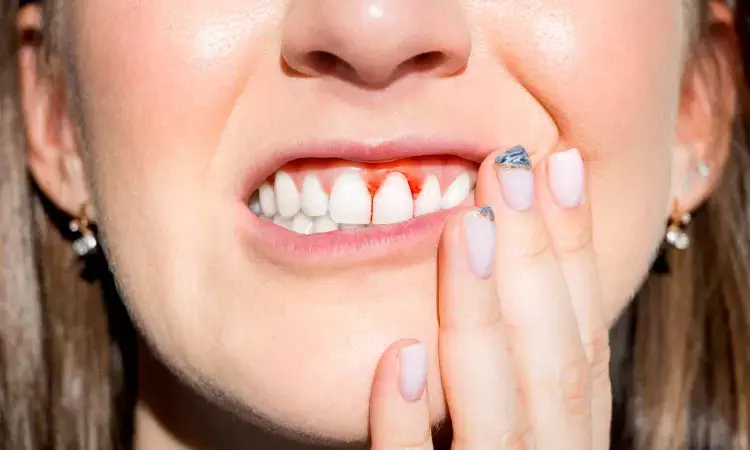- Home
- Medical news & Guidelines
- Anesthesiology
- Cardiology and CTVS
- Critical Care
- Dentistry
- Dermatology
- Diabetes and Endocrinology
- ENT
- Gastroenterology
- Medicine
- Nephrology
- Neurology
- Obstretics-Gynaecology
- Oncology
- Ophthalmology
- Orthopaedics
- Pediatrics-Neonatology
- Psychiatry
- Pulmonology
- Radiology
- Surgery
- Urology
- Laboratory Medicine
- Diet
- Nursing
- Paramedical
- Physiotherapy
- Health news
- Fact Check
- Bone Health Fact Check
- Brain Health Fact Check
- Cancer Related Fact Check
- Child Care Fact Check
- Dental and oral health fact check
- Diabetes and metabolic health fact check
- Diet and Nutrition Fact Check
- Eye and ENT Care Fact Check
- Fitness fact check
- Gut health fact check
- Heart health fact check
- Kidney health fact check
- Medical education fact check
- Men's health fact check
- Respiratory fact check
- Skin and hair care fact check
- Vaccine and Immunization fact check
- Women's health fact check
- AYUSH
- State News
- Andaman and Nicobar Islands
- Andhra Pradesh
- Arunachal Pradesh
- Assam
- Bihar
- Chandigarh
- Chattisgarh
- Dadra and Nagar Haveli
- Daman and Diu
- Delhi
- Goa
- Gujarat
- Haryana
- Himachal Pradesh
- Jammu & Kashmir
- Jharkhand
- Karnataka
- Kerala
- Ladakh
- Lakshadweep
- Madhya Pradesh
- Maharashtra
- Manipur
- Meghalaya
- Mizoram
- Nagaland
- Odisha
- Puducherry
- Punjab
- Rajasthan
- Sikkim
- Tamil Nadu
- Telangana
- Tripura
- Uttar Pradesh
- Uttrakhand
- West Bengal
- Medical Education
- Industry
Injectable Hydrogel Offers Promising Non-Surgical Approach for Periodontitis Treatment: Study

Iran: Periodontitis, a progressive inflammatory disease caused by bacterial infection, leads to the deterioration of tooth-supporting structures, ultimately risking tooth loss. While conventional treatments focus on infection control and surgical interventions, researchers in a recent study, discussed a novel injectable hydrogel that may offer an effective non-surgical alternative.
This innovative hydrogel is composed of gelatin methacrylate (GelMA) combined with surface-imprinted chitosan-modified bioglass microspheres (MIP). It is designed to deliver controlled doses of doxycycline (DOX), an antibiotic known for its antibacterial properties. Incorporating MIP microspheres plays a crucial role in fine-tuning the hydrogel’s characteristics, including swelling behavior, degradation rate, wettability, and mechanical strength, making it well-suited for periodontal applications.
The bioactive nature of this hydrogel is particularly significant, as it facilitates the formation of bone-like apatite in vitro. This property enhances the potential for periodontal regeneration by supporting new bone formation, a critical aspect of disease management. Additionally, the hydrogel exhibits strong antioxidant activity, reducing oxidative stress, which is often associated with chronic inflammation.
A key advantage of this hydrogel system is its ability to provide localized and sustained antibacterial effects. The controlled release of doxycycline effectively inhibits the growth of Staphylococcus aureus and Escherichia coli, reducing bacterial load in periodontal pockets. This targeted approach helps minimize bacterial resistance while improving treatment outcomes.
The injectable nature of this hydrogel allows for minimally invasive administration, making it a patient-friendly alternative to surgical procedures. Once implanted, it provides rapid hemostasis, helping to control bleeding at the application site while promoting a conducive environment for tissue healing.
Cellular studies indicate that MIP microspheres enhance the behavior of human dental pulp stem cells (hDPSCs). The hydrogel promotes better cell adhesion, spreading, and osteogenic differentiation, essential for periodontal tissue repair. The sustained release of bioglass ions, combined with doxycycline, creates an environment that encourages new tissue formation, potentially leading to improved periodontal regeneration.
Researchers also noted that modifying the MIP particle concentration (ranging from 2 to 7 wt%) allowed for control over the hydrogel’s physical and biological properties. Compared to standard GelMA hydrogels, the Gel-MIP formulation demonstrated superior mechanical integrity, slower degradation, and enhanced therapeutic benefits.
This breakthrough injectable hydrogel represents a promising advancement in periodontal therapy, offering a potential non-surgical treatment option that combines antimicrobial action, bioactivity, and regenerative properties to improve patient outcomes.
The findings were published online in the International Journal of Biological Macromolecules on January 31st, 2025.
Reference:
Khademi, R., Hosseini, M. A., & Kharaziha, M. (2025). An injectable gelatin methacrylate containing surface-imprinted chitosan-modified bioglass microspheres for potential periodontitis treatment. International Journal of Biological Macromolecules, 140561. https://doi.org/10.1016/j.ijbiomac.2025.140561
Dr Kamal Kant Kohli-MBBS, DTCD- a chest specialist with more than 30 years of practice and a flair for writing clinical articles, Dr Kamal Kant Kohli joined Medical Dialogues as a Chief Editor of Medical News. Besides writing articles, as an editor, he proofreads and verifies all the medical content published on Medical Dialogues including those coming from journals, studies,medical conferences,guidelines etc. Email: drkohli@medicaldialogues.in. Contact no. 011-43720751


